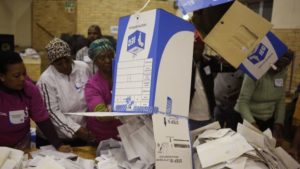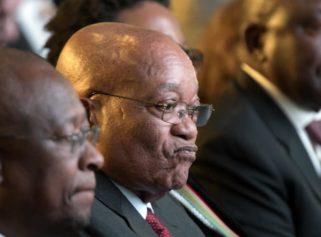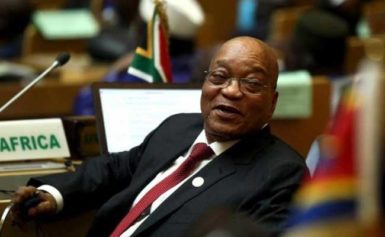
AP
South Africa’s governing African National Congress looks to be facing its biggest electoral setback since the end of apartheid with most votes now counted in local elections.
The party is trailing its main rival, the Democratic Alliance, in Port Elizabeth, Johannesburg and Pretoria.
The ANC is in the lead nationally and many results have yet to come in.
Unemployment and corruption scandals surrounding President Jacob Zuma have tarnished the ANC’s image.
“We have shown some incredible growth,” Democratic Alliance leader Mmusi Maimane told 702 radio. “We call this the change election because we felt that it was a referendum on Jacob Zuma as a national figure, but we also had a referendum about the future of South Africa.”
Final results are expected on Friday.
The municipal election result is probably the biggest wake-up call the governing African National Congress has received since it ushered in democracy in South Africa in 1994.
Clearly the ANC still commands huge support across the country, but that support is waning. It can no longer take it for granted that the black majority will blindly follow it. Its power and influence is in decline.
In-fighting, public squabbles and a host of corruption scandals have been slowly eating away at the reputation of a once glorious movement of the people.
The best example is in the Nelson Mandela Bay municipality where the ANC is lagging behind in a city which has a rich history of anti-apartheid struggle. The man poised to be the new mayor is the Democratic Alliance’s Athol Trollip, who is white.
Twenty-two years after the end of apartheid, black people are now voting on issues and not on race. Trollip, who speaks fluent Xhosa, would not be where he is if the vast majority of black people had not voted for him.
The ANC has won more than 60 percent of the vote at every election since the end of apartheid more than two decades ago.
With two-thirds of the votes counted on Thursday, the ANC had 53 percent, followed by 28 percent for the Democratic Alliance and 7 percent for the radical Economic Freedom Fighters.
The Democratic Alliance looked on course to keep control of Cape Town, the only major city currently not run by the ANC.
The local elections are being seen as an indication of the mid-term popularity of President Zuma. Correspondents say a poor ANC performance could embolden Zuma’s rivals within the party to challenge him.
The next presidential elections are due in 2019, but Zuma cannot stand for a third term.
Read more here.


